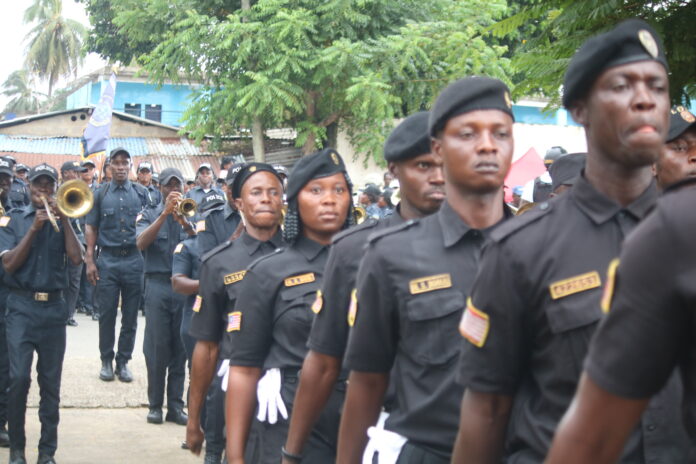—as call for Military Support as Seizures Soar
In an urgent call to action, Eugene Fahngon, Director General of the Liberia Broadcasting System (LBS), has called on President Joseph Nyumah Boakai to deploy the Armed Forces of Liberia (AFL) in support of the Liberia Drug Enforcement Agency (LDEA) to combat the country’s escalating drug crisis. Speaking at the national observance of World Anti-Drug Day on June 26, Fahngon described Liberia’s synthetic drug epidemic—particularly involving substances like “kush”—as a national emergency requiring not just words, but structural action backed by policy, manpower, and, if necessary, force.
“I am calling on the president, who is also the commander-in-chief of the Armed Forces, to declare war on drugs and substance abuse—not metaphorically, but structurally,” Fahngon declared in his keynote address. “Not only through words, but with action. Use weapons of policy, investment, manpower, technology, and, if necessary, lethal weapons.”
His statement aligns with growing concerns over the proliferation of synthetic narcotics in Liberia, with kush—a highly addictive cocktail of drugs—emerging as a widespread threat to public health and national stability. The national theme of this year’s observance, “The Evidence Is Clear — Invest in Prevention Without Delay,” captures both the urgency and the strategic shift necessary to address the crisis.
From Emergency to Engagement
President Boakai had previously declared a state of emergency on the issue, prompting mandatory drug testing for government officials, including Vice President Jeremiah Koung. While Fahngon commended these initial steps, he warned that symbolic gestures alone will not be enough to combat the entrenched networks driving the country’s drug problem.
“Declaring a state of emergency was the right first step, but it can only alert us—it cannot defend us,” he said. “The time has come to move from emergency to engagement, from alert to assault, from reaction to action.”
Fahngon’s proposal includes stationing AFL personnel at border entry points alongside LDEA officers to deter traffickers and strengthen interdiction efforts. He argued this move would not constitute militarization, but rather a reinforcement of national defense in the face of an unconventional threat.
A National Misfortune: Underfunded LDEA
Despite recording significant successes, the LDEA remains severely under-resourced. Fahngon described this underfunding as a “national misfortune” that undermines the fight against drugs.
According to LDEA statistics, the agency seized 9,651.32 kilograms of narcotics between June 2024 and June 2025, with an estimated street value of nearly USD $5 million. The bulk of the drugs confiscated were kush (5,494.50 kg), followed by marijuana (4,040.02 kg), cocaine (32.69 kg), tramadol (68.73 kg), heroin (11.95 kg), and various precursors used in drug manufacturing.
In terms of enforcement, the agency reported the prosecution of more than 33 drug traffickers, some of whom received prison sentences of up to 20 years. The LDEA also trained 548 officers in intelligence gathering and border operations and developed a five-year strategic plan to guide future efforts.
Fahngon offered five key recommendations to bolster LDEA operations:
- Integrated joint security support,
- Acquisition of drones and surveillance equipment,
- Finalization of the national drug enforcement policy,
- Stronger community mobilization including traditional leaders,
- Greater protections for whistleblowers.
Government Backs Comprehensive Strategy
Justice Minister Oswald Tweh underscored that the fight against narcotics goes beyond law enforcement, requiring national and community collaboration. He urged citizens to help identify and report drug dens in their neighborhoods. “We must invest in prevention and empower our youth to avoid harmful substances,” Tweh said.
LDEA Director Anthony Suoh echoed this call, emphasizing that the agency’s effectiveness hinges on active community participation. “The consequences of drug abuse are enormous and affect every aspect of society,” he warned.
The Minister of Youth and Sports also expressed support for the inter-agency and grassroots approach to combating drug use, particularly among Liberia’s vulnerable youth population.
River Gee: A Snapshot of Community Resistance
A parallel observance in River Gee County provided a vivid illustration of local enforcement and community solidarity. The LDEA publicly destroyed over 14 million Liberian dollars worth of seized drugs, including kush, heroin, marijuana, tramadol, and precursor chemicals.
Agent Richard N. Nango, commander of the River Gee LDEA detachment, praised local cooperation and stressed the importance of vigilance in detecting and reporting drug-related activities.
River Gee County Attorney Atty. Fofie V. Kamara reaffirmed the necessity of joint community-security efforts, stating, “The fight against drugs is a shared responsibility. No single institution or agency can do it alone.”
Residents expressed gratitude for the LDEA’s visible role in community protection and pledged continued support for enforcement efforts.
Toward a United Front
Established in 1998, the LDEA operates under the Ministry of Justice and is tasked with leading the nation’s counter-narcotics efforts, particularly at border points. Its recent operations and public destruction events are intended to send a clear message to traffickers and users alike.
As Liberia grapples with the complex challenges of drug trafficking and abuse, Fahngon’s dramatic call for military involvement marks a turning point in public discourse. Whether President Boakai will adopt such a bold approach remains to be seen, but the consensus across government, law enforcement, and communities is clear: the war on drugs can no longer be delayed—and must now be won through unity, strategy, and resolve.



